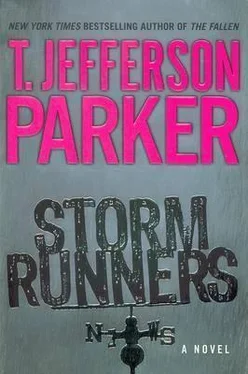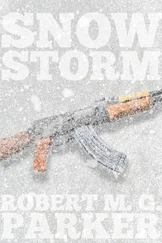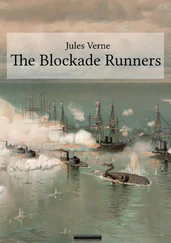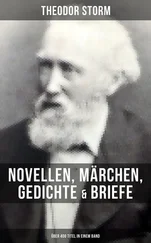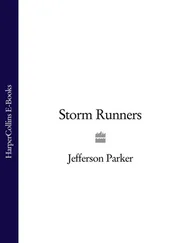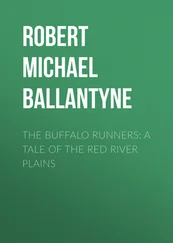Half an hour later the rain stopped. Sunlight powered through big cracks in the clouds and they could see the torrents of runoff coming down the gulleys and washes to join up with the swollen San Luis Rey on its way to the ocean.
“That had to be five inches,” said Frankie. “I wonder what everybody else got.”
“I hope there is an everybody else,” said Ted.
“We can sit or walk,” said Stromsoe. “But we won’t be driving this thing for a while.”
They couldn’t get close enough to the barn to go through the remains. The water was two feet deep and fast, and gave no sign of abating soon. Frankie stood knee-deep in it, shooting pictures, feet spread for balance as the current shoved against her. She fished a book from the flood, and what looked to Stromsoe like an old album of weather maps. She shook her head and waded unsteadily back to him.
They hiked across the hills, staying to the brushy sides and stable tops, to a dirt road that was just barely passable on foot. Freed from the slickers to keep them dry, the dogs cavorted and rolled in the mud. They made Gopher Canyon Road. A ranch hand in an old red-and-white Chevy pickup truck gave them a ride to Frankie’s house. He spoke no English but gave them a hearty smile and wave as he drove away.
Stromsoe saw the tears running down Frankie’s cheeks as she dug the keys from her bag.
“It’s gone,” she said. “Everything he did. Everything I improved on.”
“You’re not.”
She nodded without looking at him, then walked to her front door.
At seven that evening Stromsoe waited in the hushed immensity of the Our Lady of the Angels Cathedral in Los Angeles. An ocean of pews stretched out before him toward the distant altar and the small red crucifix.
Choat sat down behind him. He wore a black raincoat over a gray suit, a white shirt with a round collar and pin, a wine-colored necktie.
“Feel safer with God nearby?” he asked.
“Less chance you’ll punch me,” said Stromsoe. “Let’s walk.”
“Why the hugger-mugger?”
“You’ll see.”
Stromsoe led the way down the ambulatory and back out the monumental bronze doors. Outside the air was cold and the wind was steady from the west. They entered the cloister garden, where the storm had pounded the flowers flat and raindrops still clung to the tree leaves.
Stromsoe handed Choat four pictures he’d printed from Frankie’s little digital camera, all of the incinerated barn.
Choat’s face went bright red.
“What’s this to me?” Choat asked. “It’s nothing.”
“That’s not what your face says. You know what it is. It’s Frankie’s barn.”
“I don’t care about her barn.”
“You used to. Listen to this.”
He pulled the player out of his pocket and turned the volume up plenty high.
I want you to burn down Frankie Hatfield’s barn with all her rainmaking stuff in it...
Stromsoe watched the doubt, the acceptance, then the anger register on Choat’s big scarred face.
“Cedros,” muttered Choat. “I don’t get it. He tapes me like the little f — pardon me — fellow he is, then does the deed anyway?”
“He got tired of being your bad guy, so he wore the wire. He never touched the barn. Mother Nature did the job. But your solicitation stands. Your bosses might like to hear it. The D.A. might. There are some media people who’d love to hear you. I’ve got ten discs like that one, just waiting to go to loving homes.”
They descended the grand staircase toward the lower plaza. Above them the stars blinked deep in the black sky.
“What do you want?” asked Choat.
“No more contact with Frankie. You so much as think her name and I’ll ruin you. And no more contact with Cedros either.”
They stood on the vast lower plaza, the cathedral towering over them, the palms hissing in the wind.
“What guarantee do—”
“You don’t get any goddamned guarantee.”
Choat stepped forward and stabbed a finger into Stromsoe’s chest.
“Watch your language, security guard. You’re on the holy site of the world’s third largest cathedral and—”
Stromsoe absorbed Choat’s stout finger, and the shift of weight that accompanied it.
Then in one purposeful motion he locked his hands around the big man’s forearm, pivoted, squatted, hauled Choat over his back, and slammed him onto the cement. He really got his shoulders into it.
“I was raised Lutheran.”
Choat lay there gasping, eyes and mouth wide. His looked up at Stromsoe, his face going pale.
“Do we have a deal, Pat?”
Choat glared up at him, mouth open, but all he could do was swallow great lungfuls of air.
“Sure, fine, think about it. You’ll see the light.”
In the late-night twilight of Pelican Bay Prison, Lunce gave Mike Tavarez his usual perfunctory weapons check. In all of Tavarez’s years as an inmate he’d never seen an exit-cell search yield a hidden weapon, as if wagging your tongue or spreading your cheeks and taking five deep breaths would magically send a blade clanging to the floor. The inmates always knew when the exit-cell check was coming. Even the dullest and most furious men found ways to have weapons waiting for them when and where they were needed.
Tavarez put his shoes and clothes back on and backed up to the bean chute for the cuffs.
He followed Lunce down the cell-block walkway, heard the whispers of the men, not his men but the others with which La Eme had détente — the Aryan Brotherhood and the Black Guerillas and the Crips of the Rollin’ 60s and the Eight Trays and Hoover Street — and the scores of lesser gangs that ruled the prisons like the tribes they were.
“X.”
“X.”
“Who do the SHU? You do the SHU.”
He saw a plastic kite bag on a string lilting down from tier three to tier two, graceful as its handler navigated the internal air currents of the great prison to land it at the proper cell below him.
Tavarez said nothing. He padded along in his canvas slip-ons, handcuffed as always, but his senses keen and his heart beating hard. Lunce stood at the door leading to the back side of the east-wing blocks and nodded up at the security camera. A moment later the door groaned open and Tavarez led the way through.
“You’re walking fast tonight,” said Lunce.
“I enjoy family visits.”
“I’ll bet you do. Wonder if it’ll be the little blonde again.”
“I never know what they’ll come up with,” said Tavarez. He didn’t want to talk to Lunce tonight. It was uncomfortable and he didn’t want a quirk of speech to arouse Lunce’s suspicion. He swallowed a little bit of his own blood.
“Yes, you do. You control everything.”
“If I was powerful, I wouldn’t be walking around in this freezing prison in nothing but peels and slip-ons.”
“With reservations for the SHU.”
“Right.”
“You should have worn a Halloween mask. Scared the shit out of her. Or maybe turned her on.”
“Right.”
“My kid went as a werewolf, got sick on the candy, and wouldn’t eat his dinner.”
Tavarez led the familiar way through the back side of the east wing. The walkway was off-limits to anyone but COs, administrative prison personnel, and escorted suppliers, who could bring their vehicles in only through the double sally ports of the main supply entrance.
When Tavarez stepped outside, the chill hit him like a bucket of ice water down the back. It was a typical post-storm October night in Del Norte County — low forties and damp enough to find your bones. The only good thing was the smell of the great Northern California forest that surrounded them, the aroma of millions of conifers and the square miles of mulch and moss and ferns that made up the forest floor.
Читать дальше
Конец ознакомительного отрывка
Купить книгу
